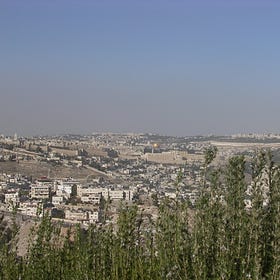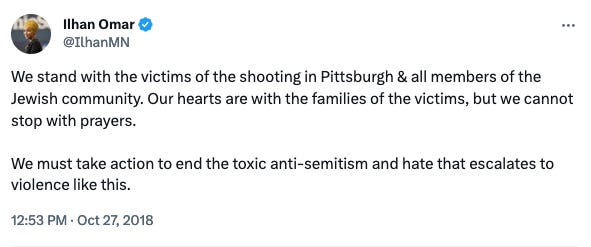Your responses to 'Out of Zionism'
And a comment on Biden, the left, and an increasingly dangerous war
On Tuesday, I sent out an essay about the evolution of my relationship with Israel and Palestine in light of both the Hamas atrocities of Oct. 7 and Israel’s even deadlier attacks on Gaza. I got so many direct and heartfelt responses that I feel I have to share some of them with you. They’re below.
Before I get to them though, I’m going to share some sketched-out thoughts about a war that is getting more dangerous than a lot of Americans realize, and the way it’s fracturing critical political coalitions here in the states. And if you haven’t had a chance to read my essay from Tuesday, here’s a link to it:
Out of Zionism
Over the last 24 hours, the Israeli military says it struck over 400 targets in Gaza, including in at least two refugee camps. Those airstrikes, an escalation over the already intensifying bombing a day before, killed over 700 people. That one-day death toll is according to the Hamas-run Gaza health ministry—which is the only source on death tolls in Ga…
Five years ago today, a far-right white supremacist burst into Pittsburgh’s Tree of Life synagogue on a Shabbat morning and opened fire, killing 11 people and injuring seven more. It was the deadliest attack on Jews in U.S. history. People from across the left and other communities threatened by white supremacy responded with solidarity. American Muslims donated $190,000 for the burial and other expenses of the victims’ families. Wasi Mohamed, the head of the Islamic Center of Pittsburgh, organized security for a memorial service, adding: “Whatever the [Jewish] community needs, we’ll be there for them.” The local chapter of Democratic Socialists of America organized a solidarity session on identifying and fighting white nationalism. Rep. Ilhan Omar, a Somali-American and one of the first two Muslim women to serve in Congress, tweeted:
I think that’s worth keeping in mind right now. There has been a lot of talk about the widening fractures, especially in left and liberal circles, caused by the spiraling tragedies in Israel/Palestine. Among the most vocal American Jews, one of the most stalwartly liberal blocs in U.S. politics for nearly a century, the feeling seems to be fear, confusion, and in many quarters a sense of betrayal. In an emblematic piece, the New York Times cited a Jewish mother in Atlanta who lamented “that her child’s progressive private school had not addressed the [Oct. 7] attacks in Israel with the same kind of empathy it showed after local killings of Asian Americans.”
At the same time, many liberals and leftists clearly feel betrayed by the president and the institutional Democratic Party’s unbending support for Israel’s ongoing war of revenge in Gaza, which to date has claimed an officially reported 7,000 Palestinian victims, about half of them children, along with dozens killed in reprisals and violence in the West Bank. In the latest Gallup poll, Biden’s approval rating fell 11 points among Democrats and two points among independents, pushing him to a tie for his all-time lowest rating at 37%. His intraparty approval rating is still high, at 75%. But heading into a 2024 election that everyone predicts to be extremely tight, the defection of even an appreciable number of young and nonwhite voters at the core of his base could spell doom. And this, in an election whose results could ultimately decide whether the United States remains a democracy.
These fractures aren’t new; they represent both a demographic and generational divide among liberals and the left on Israel. That divide must be confounding to outsiders to the conversation but it makes perfect sense to me: Israel is for millions of Jews a response to centuries of oppression, antisemitism, a much-oppressed people’s need for a sense of safety, space, and belonging. It is also a manifestly colonial project, armed and backed by the imperial hegemon, that is itself oppressing a stateless, currently far more vulnerable population.
Those positions can seem so diametrically opposed that they are impossible for most people to keep in their heads at the same time, to the point that many people who hold either view cannot






